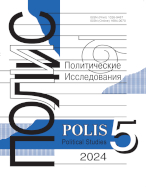Prerequisites for the Rise and Consolidation of Polyarchies
DOI: 10.17976/jpps/2002.06.05
Dahl R. Prerequisites for the Rise and Consolidation of Polyarchies . – Polis. Political Studies. 2002. No. 6. https://doi.org/10.17976/jpps/2002.06.05
This publication is the Russian translation of Chapter 18 from a book, much-talked-of, by a well- known American political scientist, R. Dahl (Dahl R.A. Democracy and Its Critics. New Haven, 1989). Having set himself the question of why stable polyarchy has developed in some countries, and not others, the scholar sets off some conditions which, if available, make polyarchy almost a sure thing. Thoroughly analyzing the experience of many countries, he, on the basis of this analysis, comes to the conclusion that a country is very likely to develop and sustain the institutions of polyarchy (a) if the means of violent coercion are dispersed or neutralized; (b) if it possesses a modern dynamic pluralist society; (c) if it is culturally homogeneous, or, if it is heterogeneous, is not segmented into strong and distinctive subcultures, or, if it is so segmented, its leaders have succeeded in creating a consociational arrangement for managing subcultural conflicts; (d) if it possesses a political culture and beliefs, particularly among political activists, that support the institutions of polyarchy; (e) if it is not subject to intervention by a foreign power hostile to polyarchy. By the same token, if a country lacks these conditions, or if the obverse conditions are strongly presented, a country will almost certainly be governed by a nondemocratic regime. In countries with mixed conditions, according to Dahl's conclusion, if polyarchy exists at all, it is likely to be unstable; in some countries, regimes may oscillate between polyarchy and a nondemocratic regime.
See also:
Weber M.,
Russia's Transition to Pseudoconstitutionalism. – Polis. Political Studies. 2006. No2
Brinkman von A.,
Unauthoritative Laws (To the Psychology of Russian Executive Power) (Foreword by I.L. Belenky). – Polis. Political Studies. 2006. No1
Massing O.,
Domination. – Polis. Political Studies. 1991. No6
Aron R.,
An Essay on Liberties: A Universal and Unique Formula of Liberty Does Not Exist. – Polis. Political Studies. 1996. No1
Bruder W.,
Bureaucracy. – Polis. Political Studies. 1991. No5





.jpg)






 print
print
.jpg)
.jpg)